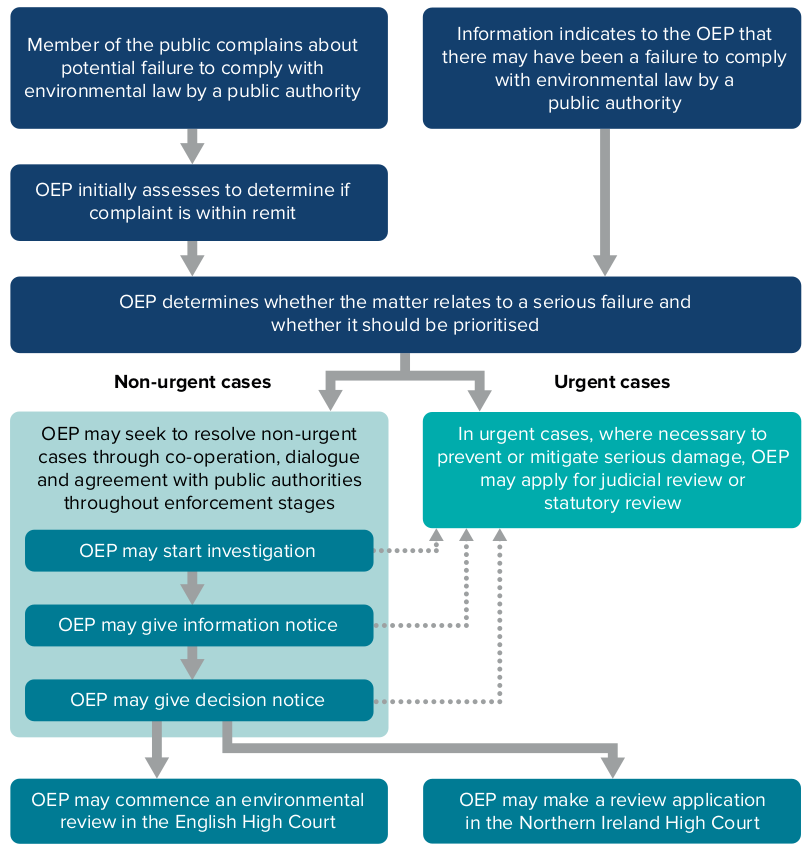Enforcement: How we will investigate suspected serious failures to comply with environmental law by government and other public authorities and enforce compliance where needed
Our enforcement functions encompass a range of powers and duties including receiving and assessing complaints, conducting investigations and commencing legal proceedings. We can only use these functions to identify and respond to serious failures to comply with environmental law by government and other public authorities.
We are not able to take enforcement action against private entities such as businesses or individual people in relation to their private functions. That responsibility remains with primary regulators such as the Environment Agency, Natural England and the Northern Ireland Environment Agency.
Where private businesses undertake public functions, we may have a remit in relation to those functions and we will work with primary regulators to understand and identify potential overlaps and prioritise accordingly (see section 3.8 on how we will work with others). Our enforcement functions do not therefore duplicate those of others.

Our approach
Our approach is set out in detail in our enforcement policy in annex A.
We will consider and prioritise between cases where information, from complaints or other sources, indicates there may have been a serious failure to comply. If a particular case involves transboundary issues, we will seek to co-operate with the relevant public authorities in those countries in appropriate circumstances. Section 3.8 sets out further detail on how we will do this.
We will focus strategically and on the most significant matters, such as failures to comply with environmental law that are systemic, recurrent or may cause serious harm. As part of this, we can consider individual but related matters which, when taken together, indicate the possibility of a serious issue. We will be intelligent in our choices, knowing that sometimes the law may not be designed well or conflict with other laws (as discussed in section 2.3). We will take this into account in determining how best to respond, and which of our functions to use.
Where we respond through our enforcement functions, our approach will be to challenge and resolve failures where we can without taking cases to court. We will normally try to resolve the issue at an early stage through dialogue and agreement. Where we regard the matter as serious, this may include an investigation and seeking information from the public authority. Where a resolution is reached, we will normally publish the results.
We will be ready to turn to our further enforcement powers, including court proceedings, to remedy serious failures and to enable environmental law to have its full intended effect. We can take proceedings in the English High Court through a process called environmental review, and in the Northern Ireland High Court through a review application.
We can take cases to court using judicial review if urgent action is needed to prevent or mitigate serious damage to the natural environment or to human health. We can also apply to intervene in a judicial review or statutory review brought by someone else. We will seek to do this when we consider that our intervention would assist the court and contribute to our principal objective, and it is a matter we prioritise. It will be for the court to determine whether our intervention is permitted.
To take each step of our enforcement functions, we must judge that a case meets certain legal tests – including whether a public authority’s conduct, if it occurred, would amount to a serious failure to comply with environmental law. We set out how we will judge this in our enforcement policy (annex A). In making our assessments, there may be situations of uncertainty. In such cases, we will take a risk-based approach. The greater the importance of the natural environment feature at risk, the more significant the potential human health impact, or the greater the potential effect of our actions, the greater the scope for adopting a proactive approach that addresses the risk of harm through proportionate investigation and enforcement action.
To bring public authorities into compliance we will work to identify the causes of serious breaches, and the actions needed to correct them, prevent their recurrence, and remedy or mitigate their consequences. Where we make recommendations, we will monitor that they are taken up.
We will expect the wider community of public authorities to learn from the matters we progress to better protect and improve the environment through their own compliance with the law. We will work to ensure our findings are heard and understood so this happens.
Prioritising our enforcement activity
Our approach to prioritising all our work is considered in section 3.2. This applies to enforcement as it does to other functions.
There are specific factors to which we must have regard in prioritising enforcement cases. The Environment Act 2021 requires us to have regard to the particular importance of prioritising cases that have or may have national implications. We must also have regard to the importance of prioritising cases that relate to ongoing or recurrent conduct, that we consider may cause or have caused serious damage, or that raise points of environmental law of general public importance. These factors are reflected in our enforcement policy in annex A.
